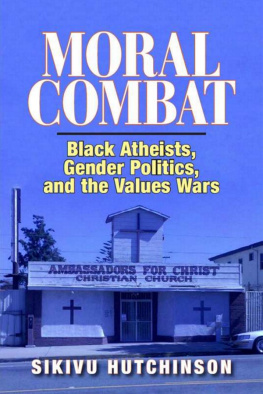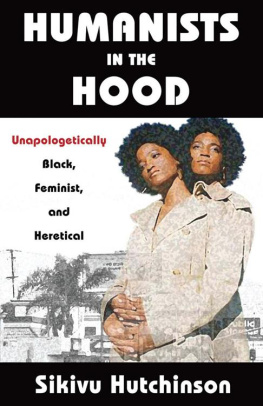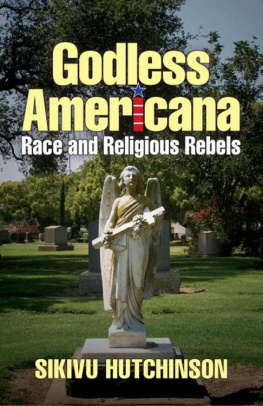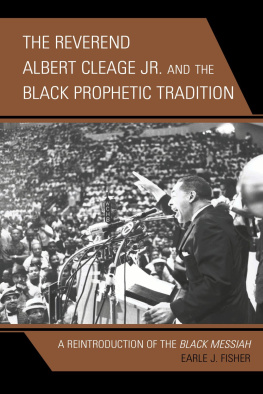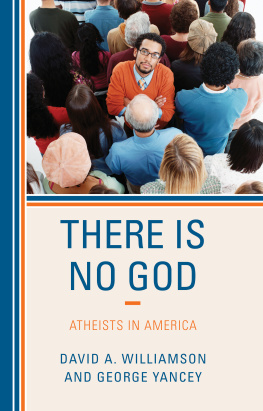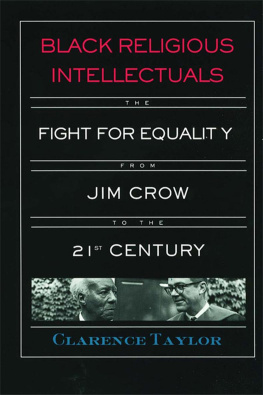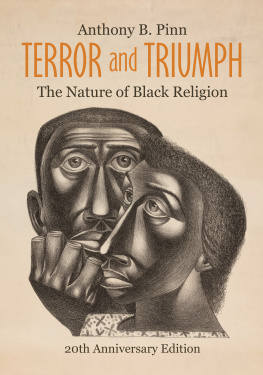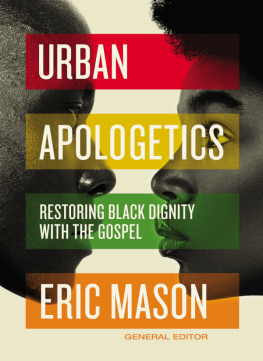

Publishers Cataloging-in-Publication
(Provided by Quality Books, Inc.)
Published 2011 by Infidel Books
Copyright 2011 Sikivu Hutchinson
Hutchinson, Sikivu.
Moral combat : Black atheists, gender politics, and the values wars / by Sikivu Hutchinson.
p. cm.
Includes bibliographical references and index.
ISBN-13: 978-0-578-07186-2
ISBN-10: 0-578-07186-X
E-Book ISBN: 978-1-61397-428-5
1. African AmericansReligion. 2. African Americans Politics and government. 3. Christianity and atheism. 4. Feminism. I. Title.
| BR563.N4H88 2011 | 277.3008996073 |
| QBI11-600019 |
Acknowledgments
A book is never possible without a community of friends, co-conspirators, and constructive critics. Thanks to all the generous interview respondents in the African American atheist and free thought communities who took the time to provide their rich insights for this work. My deep appreciation to my husband Stephen Kelley and friend Kamela Heyward-Rotimi for their support as well as patient, thoughtful critiques of early drafts of this book. Thanks are also due to Diane Arellano, Heather Aubry, and Naima Cabelle for their unswerving encouragement of this work. Moorhead State University professor Shondrah Nash also provided early reinforcement and advocacy for the publication of this book. And finally thanks to my parents Yvonne Divans Hutchinson and Earl Ofari Hutchinson for providing the intellectual spark, and the secular context, that set me on my way.
In Memory of Jay Hutchinson Kelley
Contents
Anyone living in a community with 400 churches who hasnt found god in any of them hopefully has figured out that there is no god.
Naima Cabelle, black atheist feminist
Faiths smorgasboard beckons irresistibly from Americas city streets. A cross-country drive tells the story of its market value and allure, its unshakeable hold on the schizoid psyche of sex and Jesus-obsessed Americana. There is a church for every family, every true believer, every providence haggler, and every fence sitter; a supernatural crack fix for every creed, taste, and predilection. In the one mile radius from my house in South Los Angeles to the corner of Florence and Normandie, there are fourteen churches. Most of these structures are storefronts, austere and unobtrusive, denominations flowing from Latino Pentecostal to black Baptist to multiracial Catholic. Woven seamlessly into the workaday facades of other businesses, they offer quiet testimony to the areas shift from a predominantly African American enclave to a mixed Latino and black community. In the aftermath of the 1992 Rodney King beating verdict, Florence and Normandie gained national notoriety as a bellwether for black rage. There is an auto parts store on the northwest corner where white truck driver Reginald Denny was pulled from his vehicle and beaten by four African American young men after news of the verdict exploded across the city. On the other side of the street two gas stations bustle, fronted by a strip mall to the northeast. Emblems of the Southern California trinity of cars, faith, and quick cheap retail, these spaces each tap into different yet similar reservoirs of urban yearning.
In the seventeen years since the verdict and ensuing civil unrest, these streets have not dramatically changed. Whereas development in predominantly white communities to the west has flourished, the grand photo-op promises of federal redevelopment made about South L.A. by then President George H.W. Bush have gone largely unfulfilled. Time lapse photography might reveal the dedication and construction of the strip mall, new oil companies taking over the gas stations, the opening of a Mexican panaderia, and a Salvadoran pupuseria. Time lapse photography would also reveal the resilience of the storefront church, an indelible fixture of segregated communities of color.
While the storefront church is a bit player in my narrative, it has a premier role in the spiritual geography of contemporary African American communities. In an era in which African American communities nationwide are in socioeconomic crisis, the cultural dominance of organized religion merits critical evaluation. In a political climate in which the social justice compass of the Black Church has been broken by consumerism, institutional sexism, and faith-based witch hunts of gays and lesbians, its moral capital is increasingly dubious. Yet, as the late evening audiences at the fourteen storefront church services demonstrate, the narcotic of faith still seduces, captivates, and inspires.
A balm for suffering, a source of atonement, and a nexus for kinship and community, organized religion serves multiple functions in African American communities. However, alternative secular belief systems can challenge its hierarchy of moral principle and offer a basis for meaning and social justice. In this book I will contextualize this 21st century struggle through the feminist lens of black humanist atheist belief, examining such themes as moral combat in contemporary American politics, the gender complexities of free thought and atheism, and secular humanist social justice possibilities in African American communities.
According to the New York Times , a small but growing segment of the American population, galvanized in part by the political extremism of the Religious Right, has begun organizing nationwide and becoming more vocal about its atheism. Over the past several years, atheism has emerged as a dynamic social and political force. Championed by such popular white author-activists as Richard Dawkins, Christopher Hitchens, Sam Harris, and Daniel Dennett, the so-called New Atheist movement has inspired a broad cross-section of atheists who have grown increasingly vocal about the incursions of organized religion into American politics. Although these writers approach atheism and the politics of religion from varying ideological and disciplinary perspectives, their militancy has inspired worldwide atheist advocacy. In dramatic departure from the marginalization of atheism during the era of notorious twentieth century atheist activist Madalyn Murray OHair, the New Atheists have commandeered a space in popular discourse.
While African Americans are not prominent in the New Atheist movement, the 2008 American Religious Identification Survey concluded that more people of color are moving away from religion. In most African American communities, atheism is akin to donning a white sheet and a Confederate Flag. In others its ostensibly tolerated yet whispered about, branded culturally incorrect and bad form if not outright sacrilege.
According to the Pew Forums 2009 Religious Portrait of African-Americans, blacks are more likely to report a formal religious affiliation (than other groups) with fully 87% of African Americans describing themselves asreligious. In addition,
79% say religion is very important in their lives, compared with 56% among all U.S. adultsEven a large majority (72%) of African Americans who are unaffiliated with any particular faith say religion plays at least a somewhat important role in their livesMore than half of African Americans report attending religious services at least once a week, more than three in four (76%) say they pray on at least a daily basis and nearly nine-in-ten (88%) indicate they are absolutely certain God exists On each of these measures African-Americans stand out as the most religiously committed racial or ethnic group in the nation (emphasis added).
Next page
